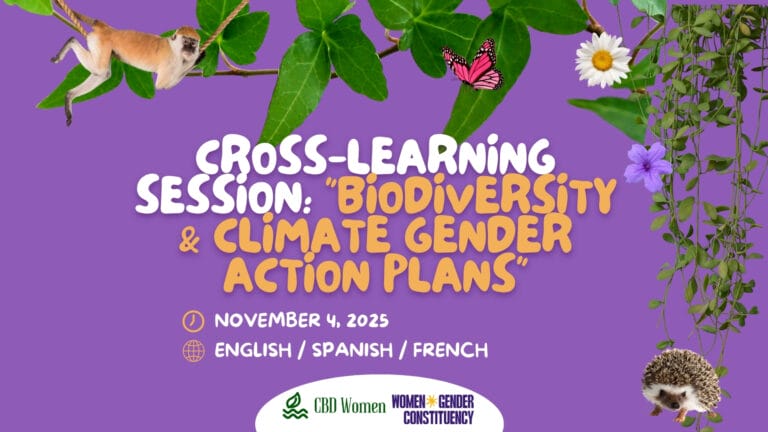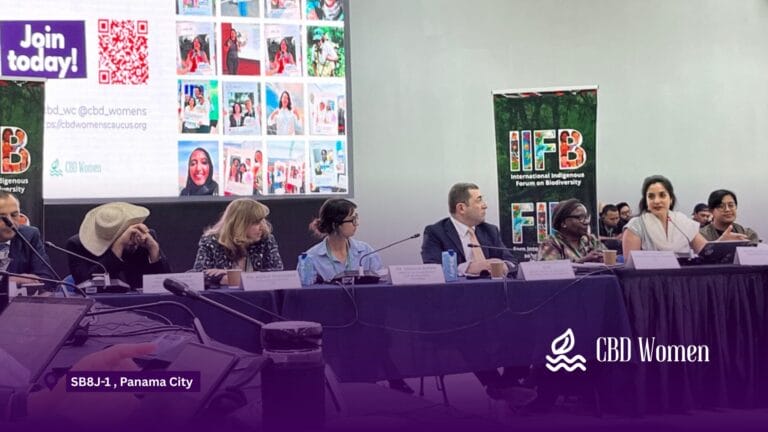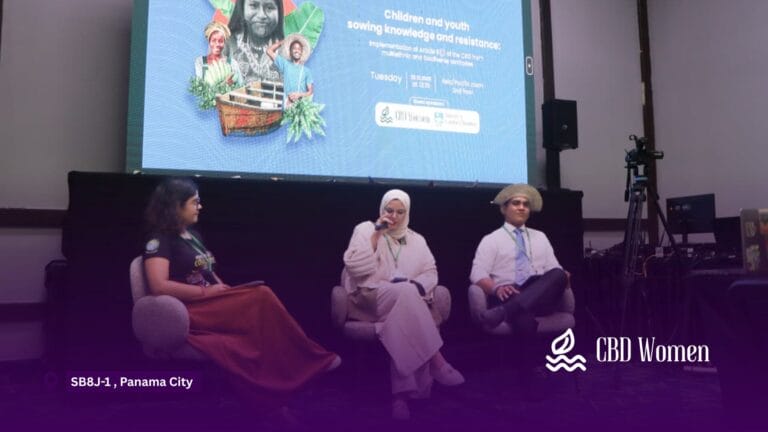By Amelia Arreguin Prado, CBD Women’s Caucus Coordinator
The Third International Agrobiodiversity Congress (IAC-3), held in Kunming, Yunnan, China in May 2025, provided a dynamic platform for sharing knowledge and innovations surrounding the sustainable use and conservation of agrobiodiversity. One of the key themes discussed was gender equality and social inclusion within agrobiodiversity management, focusing on the roles played by women and girls, farmers, fishers, herders, and Indigenous Peoples and local communities in preserving and sustainably managing agrobiodiversity.
This theme was explored through a collaborative session led by Biodiversity Alliance and CIAT, and the CBD Women’s Caucus. The session addressed the gendered dynamics of agrobiodiversity, highlighting how gender inequalities persist in the access, management, and governance of agrobiodiversity and the solutions being proposed to overcome these barriers.
The opening of the session included a written message from Mr Olivier Rukundo, Head, Peoples and Biodiversity, SCBD, and the welcoming remarks from Dr SHI Rui, Vice Dean, Forestry College, Southwest Forestry University & MS GU Fan from a network of tea farmers.
An in-depth article, developed by the co-hosts of the session, will be shared shortly. This text serves to acknowledge the session and share with you all snippets of the key discussions.


Segment 1: Role of Women and Indigenous Peoples in Agrobiodiversity Management and Traditional Food Systems
The first segment of the session, introduced by Dr. Marlen Elias, Gender Lead for the Biodiversity Alliance and CIAT, highlighted the crucial role of women and Indigenous Peoples in managing and conserving agrobiodiversity. Speakers such as Dr. Georgina Catacora-Vargas (AGRUCO), Desfari Christiani (FoMMA), and Dr. Zhang Yanyan (UNEP-IEMP) presented on the biocultural value of agrobiodiversity, local women’s markets in Indonesian Borneo, and the empowerment of women in farmers’ seed systems in China. A video message from Esther Muiru (Landesa) further emphasized the link between women’s land rights and agrobiodiversity conservation. In a lively panel moderated by Dr. Elias, the speakers explored how to better integrate women’s traditional knowledge systems into agrobiodiversity governance, the need for gender-responsive policies, and key recommendations for advancing gender equality and social inclusion in agrobiodiversity management.
Segment 2: Grassroots Partnerships and Participatory Approaches for Agrobiodiversity Management
The second segment, introduced by Ms Amelia Arreguín-Prado, Coordinator of the CBD Women’s Caucus, focused on grassroots partnerships and participatory approaches in agrobiodiversity management. A video message from Gratia E. Dkhar (NESFAS) further explored the potential of Indigenous food systems. Dr. Yiching Song (UNEP-IEMP) highlighted the essential roles of women farmers and Indigenous Peoples in living agrobiodiversity systems, while Dr. Qingwen Yang (Chinese Academy of Agricultural Sciences) discussed on-farm conservation practices in China. Dr. Ronnie Vernooy (Alliance of Bioversity International and CIAT) emphasized the need for a gender-responsive seed sector. And there was also a sparking and thought provoking written intervention from Dr Madhura Swaminathan from the Indian Statistical Institute. In the panel moderated by Arreguín-Prado, the speakers addressed changes in gender relations, the role of coalitions in the seed sector, and strategies for fostering equitable knowledge exchange through partnerships between researchers, Indigenous Peoples, and grassroots organizations.
Moving forward
The session underscored the critical importance of integrating gender equality and social inclusion into agrobiodiversity management. The contributions from experts and grassroots leaders highlighted the essential roles of women and Indigenous communities in preserving and managing agrobiodiversity. As the global community continues to advance gender-responsive policies, the session participants agreed that empowering women and ensuring their leadership in agrobiodiversity governance is key to achieving sustainable agricultural practices and biodiversity conservation. As we move forward, the Kunming Manifesto on Agrobiodiversity for People and Planet will be released soon, with its final touches being refined.
Disclaimer: The views expressed in this blog are those of the author and do not necessarily reflect the official position or opinions of the CBD Women’s Caucus.




